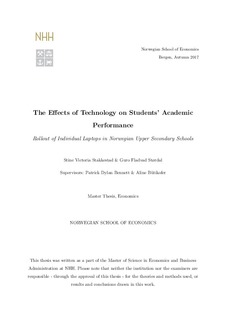The Effects of technology on students’ academic performance rollout of individual laptops in norwegian upper secondary schools
Master thesis
Permanent lenke
http://hdl.handle.net/11250/2487301Utgivelsesdato
2017Metadata
Vis full innførselSamlinger
- Master Thesis [4372]
Sammendrag
Di↵erent technologies have been implemented in the educational system in Norway over the last
decade and it has been a subject of debate whether the use of technology enhances students’
educational outcomes. The aim of this master thesis is therefore to analyze the causal e↵ect of
the one-to-one laptop program in upper secondary education in Norway on the performance in
three common core subjects: first-choice form of Norwegian, second-choice form of Norwegian,
and English. The analysis is performed on a sample of 289 upper secondary schools in the time
period from 2003 to 2016. We exploit data on average grades at school level and the rollout of
the one-to-one laptop program across the country by using a generalized di↵erence-in-di↵erence
approach and an event study specification. The results of this study indicate no clear benefits
of technology use on academic performance in upper secondary education as no statistically
significant e↵ects are found. However, the true e↵ect might be attenuated as the impact of
laptops on students’ academic performance is complex, i.e. there are both positive and negative
e↵ects, and performance is only reported as an average at school level.
The results presented in this thesis can be an important contribution to the literature in this
field as little research has been conducted in Norway to interpret the causal relationship between
technology and educational outcomes. The findings can hopefully inspire future research in the
field to increase the knowledge on technology-led education. Moreover, it may also function as
input for future decision making in the Norwegian educational system.
